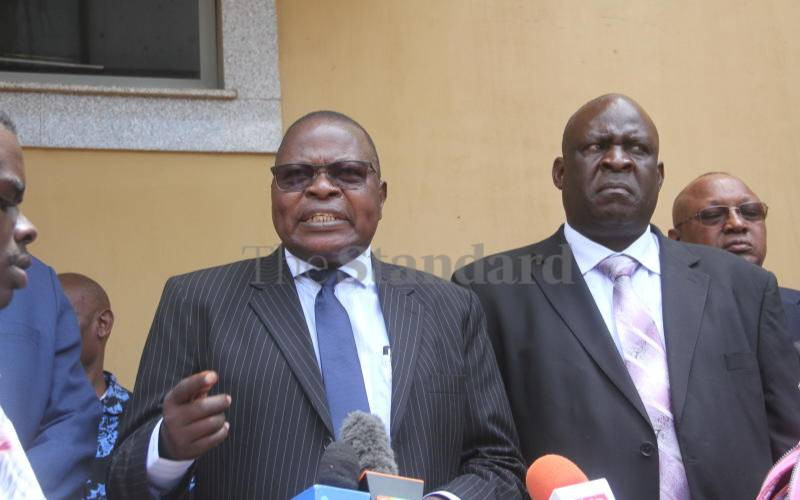
NAIROBI: Job evaluation creates an informed platform for Collective Bargaining Agreement (CBA) negotiations.
This is by providing clarity on the relative worth of a job. Job evaluation has played a constructive role in CBA negotiations for decades.
While there are various systems and methods of carrying out job evaluation, all are rooted in similar principles. Job evaluation developed in the US from the civil service classification practices and other early employer job and pay classification systems.
The spread of unionism has influenced the installation of the exercise - pushing employers to give more attention to rationalised wage structures as unionism advances.
During World War II, the National War Labour Board encouraged the expansion of job evaluation as a method of reducing salary disparities. When the Civil Rights movement began, job evaluation became a strong factor in ensuring non-discrimination in the workplace. The Equal Pay Act of 1963 required jobs to be compared on the basis of skill, effort, and responsibility to determine if they were or were not equal.
This made job evaluation part of the law governing pay determination in the US. During the Socialist era, Russia and other Eastern European countries also widely used job classification, a practice that has been carried forward.
Although job evaluation is regularly carried out at the organisational or institutional level in Africa, only Ghana has undertaken a Public Service-wide job evaluation exercise.
In 2010, as part of a Public Sector Reform Exercise by the Ghana Fair Wages and Salaries Commission, a job evaluation exercise was carried out.
SECTOR PERFORMANCE
This exercise has been widely lauded for helping bring about fairness and equality in the public sector. It is credited with improving the performance of the sector. The exercise was carried out by the commission in collaboration with the different unions across the country.
This led to all-inclusive and successful CBA negotiations in the country. A common misconception about job evaluations and the relationship between job evaluation and pay is that job evaluations lead to loss of jobs and unilateral reduction in pay.
On the contrary, job evaluations produce clear job grades, and recommend an ideal range for which jobs of a certain grade can be paid.
Rather than set a fixed salary figure, job evaluations propose figures at various percentiles which can be negotiated, taking into account other compensable factors.
It is important to note that while job grades are not negotiable, pay issues can be negotiated. This means that employees can push for better pay through a CBA negotiation.
Stay informed. Subscribe to our newsletter
They should do so within the parameters of their proposed job grade. Job evaluations are also crucial in settling disputes since the grading structures are obtained collaboratively as a group, with considerable union representation. This allows for a greater degree of transparency in the process, and takes into account the views of all stakeholders concerned.
INDUSTRIAL UNREST
The evaluation for jobs in the Public Service will help set a basis for fair bargaining and act as a preventive measure for industrial unrests, which are expensive to employer and employees.
Unfair treatment is unproductive in the long run, since employees are far less likely to work at their optimum when they are experiencing disparities in pay or when they perceive payment structures to be biased or unfair. Both the International Labour Organisation and the Salaries Renumeration Commission guidelines on CBA negotiations emphasise the need to acquire the necessary information prima facie. This means that prior to embarking on the CBA negotiation, all concerned parties should be aware of:
The market value, skill level, institutional priorities, competition, performance of the economy and pay equity; willingness of staff to compromise the salary expectations for other benefits and job satisfaction. Others include job security and staff development and critical issues that enhance productivity, reduce wastages and increase competitiveness.
The job evaluation in the Public Service will help provide data and bear the additional advantage of having been internally generated, whilst taking into account market-based figures. This provides a holistic outlook on jobs and pay.
A job evaluation exercise is in no way a substitute for CBA negotiations. Rather, it should be viewed as a tool that creates an informed platform for negotiations to establish agreed upon pay structures that are fair and equitable. The job evaluation process transforms abstract concepts like pay and worth of a job into specific measurable grades, which allows for clarity amongst both employees and employer.
This provides an informed basis for CBA negotiations, thereby increasing the likelihood of a lasting and acceptable settlement.
-The writer is a Principal Consultant, Human Capital at Deloitte Consulting
 The Standard Group Plc is a
multi-media organization with investments in media platforms spanning newspaper
print operations, television, radio broadcasting, digital and online services. The
Standard Group is recognized as a leading multi-media house in Kenya with a key
influence in matters of national and international interest.
The Standard Group Plc is a
multi-media organization with investments in media platforms spanning newspaper
print operations, television, radio broadcasting, digital and online services. The
Standard Group is recognized as a leading multi-media house in Kenya with a key
influence in matters of national and international interest.
 The Standard Group Plc is a
multi-media organization with investments in media platforms spanning newspaper
print operations, television, radio broadcasting, digital and online services. The
Standard Group is recognized as a leading multi-media house in Kenya with a key
influence in matters of national and international interest.
The Standard Group Plc is a
multi-media organization with investments in media platforms spanning newspaper
print operations, television, radio broadcasting, digital and online services. The
Standard Group is recognized as a leading multi-media house in Kenya with a key
influence in matters of national and international interest.









